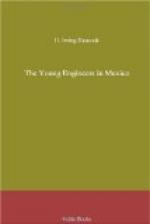The next morning Don Luis, Mr. Haynes and a New York capitalist in the party departed in an automobile, going back to the railway town. Two days later they returned. The entire deal had been put through. The mine had become the property of this group of American capitalists. Don Luis’s home was included in the sale. The money had been paid over on telegraphic advice from New York. Don Luis, in turn, had transferred his huge credit to Mexico City by wire, and this fortune now awaited his orders at the capital of the republic.
Soon after Don Luis had returned he called the young engineers aside.
“Caballeros,” he murmured, “I am delighted with the loyal service you have rendered me. Before to-day is over I shall hand you drafts on my bank at the capital for twenty thousand dollars each, gold. Then the transaction will be closed. Again I thank you. Be good enough to remain about, for I shall soon want you.”
Over the hills a white-clad figure rode on horseback. As he came nearer, still at a gallop, the man was seen to be a soldier.
“I wonder if there is any treachery in this?” muttered Harry, in Tom’s ear. “Does Don Luis intend to have us arrested, after all, and sent to prison to be held incommunicado, and so make sure of keeping us out of the way?”
“I don’t believe so,” Tom replied. “It wouldn’t be a wise move on his part. He’d be afraid that we’d denounce him even as we were being led away.”
“Then why the soldier?”
“Let’s wait and see.”
No one else appeared to have paid any heed to the horseman. A few minutes later the soldier rode up the driveway.
“Senor—Haynes?” called the soldier, holding up an envelope.
Tom passed the word. Messrs, Haynes and Ellsworth were absent, it seemed, on a walk.
“If it’s a telegram,” said Mr. Hippen, “I’m a director in the same road. It may be on railroad business. I’ll take the telegram.”
It was turned over to him. Mr. Hippen broke the seal of the envelope, took out the enclosure and read it. Then he read it aloud, as follows:
“Train thirteen wrecked this forenoon.” It was signed by President Haynes’s secretary.
“Humph!” said Mr. Hippen. “I don’t see the need of wasting the railroad’s money to send that despatch here.”
He folded it and placed it in his pocket, against Mr. Haynes’s return.
“I shall want to talk with you two for a few minutes,” Don Luis presently whispered to Tom. “I shall have my car here soon. When you see it, both of you come forward and be ready to take a short ride with me.”
In the background stood Dr. Tisco, looking on with cynical eyes.
“Of course, the poor American fools haven’t any idea that they will set out on the ride, but will never return,” murmured Don Luis’s secretary, to himself. “Pedro Gato, turned loose on the same day he was arrested, has waited a long time for his revenge. He and the dozen bandits he has gathered around him will shoot the American engineers full of holes out on the road, and Don Luis, when he returns, deluged in his own tears, will tell the awful story of the encounter with the bandits. What a clever scoundrel Don Luis is!”




